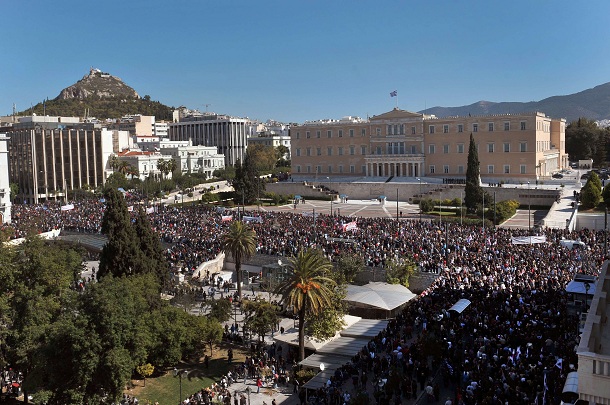Greece rejects EU bailout extension offer
Greece rejected Monday a six-month extension of its bailout program proposed by its eurozone partners. Greece's new government was elected to challenge the philosophy of the bailout program, Greek Finance Minister Yanis Varoufakis says.

Talks between Greece and finance ministers from the 19-country eurozone in Brussels ended early as Athens rejected the offer to extend and make no changes to the €240 billion loan.
Greece’s leftist Syriza party, elected on the promise that it would end austerity measures, is demanding changes to the country’s massive bailout, which expires on Feb.28.
“There is some flexibility in the current bailout program, but Athens must also stick to its main principles and targets,” Eurogroup President Jeroen Dijsselbloem told reporters after the meeting.
However, Greek Finance Minister Yanis Varoufakis told reporters in Brussels after the meeting, “Our government was elected to challenge the philosophy of the program….the idea [of] ‘some flexibility’ was highly problematic for us.”
Varoufakis said he was ready to sign a draft communique that would allow an extension of the bailout program for a period of four months on the condition that it would not impose recessionary measures.
“For instance, no cuts in lowest of pensions, no VAT (Value-Added Tax) hikes during this period, especially in regions of Greece that in the beginning of summer required all the assistance it can get to boost tourism,” he said.
“Unfortunately, that document I was prepared to sign was withdrawn minutes before the Eurogroup (meeting) began and was replaced with another document,” he added.
A new Greek program would not be very different, the Eurogroup president said.
“It would have to be based on three principles: fiscal and debt sustainability, reforming its economy to make it more competitive, and ensuring the stability of its financial sector,” Dijsselbloem added.
Ahead of the talks, Germany’s Finance Minister Wolfgang Schaeuble had said that he was “very skeptical” about reaching a solution.
The meeting is the latest attempt to find a way forward to the row after ministers discussed the dispute last Wednesday.
European Commission Vice-President Valdis Dombrovskis told reporters after the meeting that “everyone’s disappointed.”
Emergency funding
The meeting comes after the European Central Bank last week announced a $5 billion emergency loan to Greek banks, which have seen a run on their deposits as Greeks removed their savings out of concern the bailout crisis would not be resolved.
The European Central Bank has stopped accepting Greek bonds and state-guaranteed bank bonds as collateral for bank funding, meaning the only source Greek banks have for euro liquidity is emergency funding from the European Central Bank.
The newly-elected Greek government has announced it does not wish to extend its bailout deal under which the country maintains payments on its €316 billion ($357 billion) debt.
Greece has until Feb. 28 to come to an agreement with its international creditors or the government will run out of public funds.
[adrotate group=”9″]


